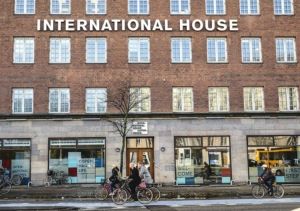News
Why International House CPH’s next chapter will be at a smaller premises
This article is more than 3 years old.
What’s the opposite of ‘outgrown’? Since its opening in 2013, the centre has streamlined its operations so effectively that it no longer requires a big working space

Somebody’s going to have to take all those letters down! (photo: News Øresund)
When International House Copenhagen (IHC) opened at Gyldenløvesgade 11 in June 2013, just around the corner from Søpavillonen at the City Lakes, the idea behind the location was to have everything that international newcomers might need under one roof.
However, according to Trine Marie Ingeberg, who has been the head of IHC since its opening, the building has now served its purpose, as the project is moving locations this summer – to a new home just around the corner.
All about the appearance
“At the beginning, a major element was its appearance,” she explained to CPH POST. In the future, IHC will need less space to provide the same service.
No need to panic though, as she assures internationals that they will still be able to find the same services as they do now, if they show up at the new location on a side-street adjacent to Gyldenløvesgade.
IHC would prefer to keep the exact location under wraps until they have an exact date for the move. An announcement is expected in May.
A need to save money
The reason for the move is simple: IHC needs to make some cuts.
Despite sitting next door to a huge complex of inter-connected buildings owned by Copenhagen Municipality, the one currently occupied by IHC is not owned by its overlords at City Hall. Instead, it is rented from ATP Ejendomme.
“The municipality has to save money, so it will be cheaper for us to move into a municipally-owned building than renting one,” explained Ingeberg.
A change in the vision
A lot has changed over the last decade, and this has affected the original vision with which IHC opened in 2013. A great many things can be carried out digitally before it meets newcomers to the city.
“When we opened, everyone came in physically. We were looking at each case for the first time when the person came in. Now we do it digitally,” said Ingeberg.
“We have a back office where we look at all the cases before people come in. Accordingly, we don’t need so much space because they always have an appointment. They just come in and it takes five minutes.”
Increasingly digital
According to Ingeberg, IHC continues to make digital improvements, and there is more streamlining ahead. After the big move, the next step will be to improve the ‘digital entrance’ to IHC.
“We are working to make it even better. At the moment there are three digital platforms: SIRI, the municipality with the International Citizen’s Service, and tax. This means you have to go through three different digital applications, but we want to have only one,” enthused Ingeberg.
“Our goal is to make it as easy and smooth as possible to come to Denmark and start your new life.”
Everyone’s been there
One of the biggest drawbacks will be the loss of the huge welcome room, which IHC has used over the years to host countless events: from Christmas parties to informative talks about property, banking matters and culture.
But in the future, IHC expects to organise more online events.
“We will still have events where people can come and listen to experts, but I think we will become more and more digital. A lot of those events can be attended from your home, but there will still, of course, be somewhere you have to physically come,” concluded Ingeberg.










































